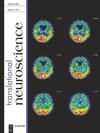额顶叶单次大脑连接有利于成功的记忆识别。
IF 1.8
4区 医学
Q4 NEUROSCIENCES
引用次数: 0
摘要
众所周知,成功的识别会产生不同的神经活动模式。许多研究使用单个识别特定区域的光谱功率或事件相关电位作为分类特征。然而,这并不能准确反映识别背后的机制,因为识别需要多个大脑区域共同工作。因此,使用与记忆相关的大脑网络的功能连接来代替局部大脑活动作为分类器,可以提高后续记忆表现的分类准确性。在这项研究中,我们在执行单词识别记忆任务时检测脑电图(EEG)信号。使用32通道帽收集记录的脑电图信号。发现与左半球额顶叶连接(P3和F3)相关的连通性测量有助于准确识别先前研究的记忆项目。使用连接特征对后续记忆结果进行分类表明,在成功的识别试验中,使用theta (3-8 Hz)连接的支持向量机分类器的分类准确率最高,为86.79±5.93%(均值±标准差)。结果强烈表明,使用单次功能连接可以实现对后续记忆结果的高度准确分类。本文章由计算机程序翻译,如有差异,请以英文原文为准。



Fronto-parietal single-trial brain connectivity benefits successful memory recognition.
Abstract Successful recognition has been known to produce distinct patterns of neural activity. Many studies have used spectral power or event-related potentials of single recognition-specific regions as classification features. However, this does not accurately reflect the mechanisms behind recognition, in that recognition requires multiple brain regions to work together. Hence, classification accuracy of subsequent memory performance could be improved by using functional connectivity within memory-related brain networks instead of using local brain activity as classifiers. In this study, we examined electroencephalography (EEG) signals while performing a word recognition memory task. Recorded EEG signals were collected using a 32-channel cap. Connectivity measures related to the left hemispheric fronto-parietal connectivity (P3 and F3) were found to contribute to the accurate recognition of previously studied memory items. Classification of subsequent memory outcome using connectivity features revealed that the classifier with support vector machine achieved the highest classification accuracy of 86.79 ± 5.93% (mean ± standard deviation) by using theta (3–8 Hz) connectivity during successful recognition trials. The results strongly suggest that highly accurate classification of subsequent memory outcome can be achieved by using single-trial functional connectivity.
求助全文
通过发布文献求助,成功后即可免费获取论文全文。
去求助
来源期刊

Translational Neuroscience
NEUROSCIENCES-
CiteScore
3.00
自引率
4.80%
发文量
45
审稿时长
>12 weeks
期刊介绍:
Translational Neuroscience provides a closer interaction between basic and clinical neuroscientists to expand understanding of brain structure, function and disease, and translate this knowledge into clinical applications and novel therapies of nervous system disorders.
 求助内容:
求助内容: 应助结果提醒方式:
应助结果提醒方式:


